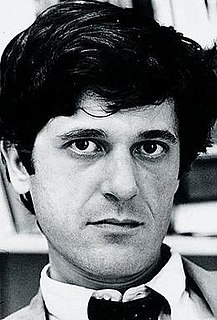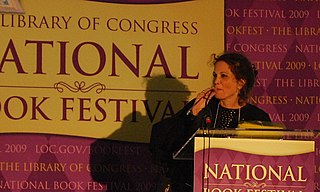A Quote by Elie Wiesel
I'm a teacher and a writer; my life is words. When I see the denigration of language, it hurts me, and it's easy to denigrate a word by trivializing it.
Related Quotes
I like to remind teachers that even though they're all overwhelmed and overloaded, and it's easy to get burned out, it really is about the kids. It only takes one good teacher to change a life - one time, and one book. That's what happened when I was a kid. I had one good teacher that came in at the right time and turned me into a writer. So never lose sight - you could be that teacher.
Every sentence has a truth waiting at the end of it and the writer learns how to know it when he finally gets there. On one level this truth is the swing of the sentence, the beat and poise, but down deeper it's the integrity of the writer as he matches with the language. I've always seen myself in sentences. I begin to recognize myself, word by word, as I work through a sentence. The language of my books has shaped me as a man. There's a moral force in a sentence when it comes out right. It speaks the writer's will to live.
As a poet and writer, I deeply love and I deeply hate words. I love the infinite evidence and change and requirements and possibilities of language; every human use of words that is joyful, or honest or new, because experience is new... But as a Black poet and writer, I hate words that cancel my name and my history and the freedom of my future: I hate the words that condemn and refuse the language of my people in America.
For language to have meaning, there must be intervals of silence somewhere, to divide word from word and utterance from utterance. He who retires into silence does not necessarily hate language. Perhaps it is love and respect for language which imposes silence upon him. For the mercy of God is not heard in words unless it is heard, both before and after the words are spoken, in silence.
Sometimes language gets in the way of the story's feelings. The reader finds himself experiencing the language of the story rather than the story. The words sit there on the page like coins, with their own opacity, as though they're there for their own sake. "A man goes into a phone booth, stirring coins in his palm." "Stirring" is such an obviously selected word. You can feel the writer looking for the word as he sat at the typewriter.
As a young writer, I was on guard against the Latina in me, the Spanish in me because as far as I could see the models that were presented to me did not include my world. In fact, 'I was told by one teacher in college that one could only write poetry in the language in which one first said Mother. That left me out of American literature, for sure.
And then he says, "The writer must be true to truth." And that's a killer, because the only way you can describe a human being truly is by describing his imperfections. The perfect human being is uninteresting - the Buddha who leaves the world, you know. It is the imperfections of life that are lovable. And when the writer sends a dart of the true word, it hurts. But it goes with love. This is what Mann called "erotic irony," the love for that which you are killing with your cruel, analytical word.
Being a slow reader would normally be a deficiency; I found a way to make it an asset. I began to sound words and see all those qualities - in a way it made words more precious to me. Since so much of what happens in the world between human beings has to do with the inconsideration of language, with the imprecision of language, with language leaving our mouths unmediated, one thing which was sensuous and visceral led to, in the use of language, a moral gesture. It was about trying to use language to both exemplify and articulate what good is.
We believe we can also show that words do not have exactly the same psychic "weight" depending on whether they belong to the language of reverie or to the language of daylight life-to rested language or language under surveillance-to the language of natural poetry or to the language hammered out by authoritarian prosodies.






































